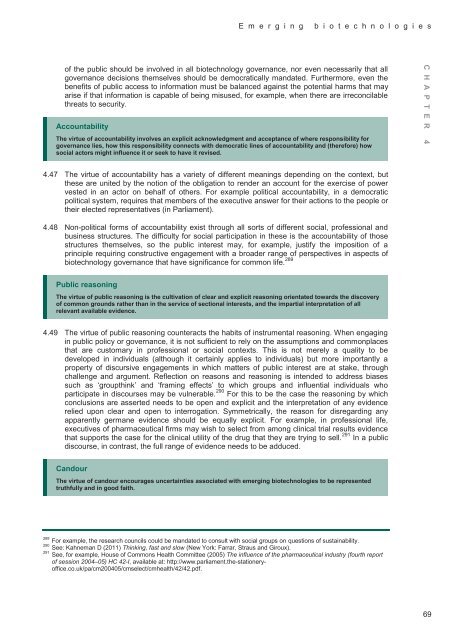Emerging biotechnologies: full report - Nuffield Council on Bioethics
Emerging biotechnologies: full report - Nuffield Council on Bioethics
Emerging biotechnologies: full report - Nuffield Council on Bioethics
Create successful ePaper yourself
Turn your PDF publications into a flip-book with our unique Google optimized e-Paper software.
E m e r g i n g b i o t e c h n o l o g i e s<br />
of the public should be involved in all biotechnology governance, nor even necessarily that all<br />
governance decisi<strong>on</strong>s themselves should be democratically mandated. Furthermore, even the<br />
benefits of public access to informati<strong>on</strong> must be balanced against the potential harms that may<br />
arise if that informati<strong>on</strong> is capable of being misused, for example, when there are irrec<strong>on</strong>cilable<br />
threats to security.<br />
Accountability<br />
The virtue of accountability involves an explicit acknowledgment and acceptance of where resp<strong>on</strong>sibility for<br />
governance lies, how this resp<strong>on</strong>sibility c<strong>on</strong>nects with democratic lines of accountability and (therefore) how<br />
social actors might influence it or seek to have it revised.<br />
C H A P T E R 4<br />
4.47 The virtue of accountability has a variety of different meanings depending <strong>on</strong> the c<strong>on</strong>text, but<br />
these are united by the noti<strong>on</strong> of the obligati<strong>on</strong> to render an account for the exercise of power<br />
vested in an actor <strong>on</strong> behalf of others. For example political accountability, in a democratic<br />
political system, requires that members of the executive answer for their acti<strong>on</strong>s to the people or<br />
their elected representatives (in Parliament).<br />
4.48 N<strong>on</strong>-political forms of accountability exist through all sorts of different social, professi<strong>on</strong>al and<br />
business structures. The difficulty for social participati<strong>on</strong> in these is the accountability of those<br />
structures themselves, so the public interest may, for example, justify the impositi<strong>on</strong> of a<br />
principle requiring c<strong>on</strong>structive engagement with a broader range of perspectives in aspects of<br />
biotechnology governance that have significance for comm<strong>on</strong> life. 289<br />
Public reas<strong>on</strong>ing<br />
The virtue of public reas<strong>on</strong>ing is the cultivati<strong>on</strong> of clear and explicit reas<strong>on</strong>ing orientated towards the discovery<br />
of comm<strong>on</strong> grounds rather than in the service of secti<strong>on</strong>al interests, and the impartial interpretati<strong>on</strong> of all<br />
relevant available evidence.<br />
4.49 The virtue of public reas<strong>on</strong>ing counteracts the habits of instrumental reas<strong>on</strong>ing. When engaging<br />
in public policy or governance, it is not sufficient to rely <strong>on</strong> the assumpti<strong>on</strong>s and comm<strong>on</strong>places<br />
that are customary in professi<strong>on</strong>al or social c<strong>on</strong>texts. This is not merely a quality to be<br />
developed in individuals (although it certainly applies to individuals) but more importantly a<br />
property of discursive engagements in which matters of public interest are at stake, through<br />
challenge and argument. Reflecti<strong>on</strong> <strong>on</strong> reas<strong>on</strong>s and reas<strong>on</strong>ing is intended to address biases<br />
such as ‘groupthink’ and ‘framing effects’ to which groups and influential individuals who<br />
participate in discourses may be vulnerable. 290 For this to be the case the reas<strong>on</strong>ing by which<br />
c<strong>on</strong>clusi<strong>on</strong>s are asserted needs to be open and explicit and the interpretati<strong>on</strong> of any evidence<br />
relied up<strong>on</strong> clear and open to interrogati<strong>on</strong>. Symmetrically, the reas<strong>on</strong> for disregarding any<br />
apparently germane evidence should be equally explicit. For example, in professi<strong>on</strong>al life,<br />
executives of pharmaceutical firms may wish to select from am<strong>on</strong>g clinical trial results evidence<br />
that supports the case for the clinical utility of the drug that they are trying to sell. 291 In a public<br />
discourse, in c<strong>on</strong>trast, the <str<strong>on</strong>g>full</str<strong>on</strong>g> range of evidence needs to be adduced.<br />
Candour<br />
The virtue of candour encourages uncertainties associated with emerging <str<strong>on</strong>g>biotechnologies</str<strong>on</strong>g> to be represented<br />
truth<str<strong>on</strong>g>full</str<strong>on</strong>g>y and in good faith.<br />
289 For example, the research councils could be mandated to c<strong>on</strong>sult with social groups <strong>on</strong> questi<strong>on</strong>s of sustainability.<br />
290 See: Kahneman D (2011) Thinking, fast and slow (New York: Farrar, Straus and Giroux).<br />
291 See, for example, House of Comm<strong>on</strong>s Health Committee (2005) The influence of the pharmaceutical industry (fourth <str<strong>on</strong>g>report</str<strong>on</strong>g><br />
of sessi<strong>on</strong> 2004–05) HC 42-I, available at: http://www.parliament.the-stati<strong>on</strong>eryoffice.co.uk/pa/cm200405/cmselect/cmhealth/42/42.pdf.<br />
69
















